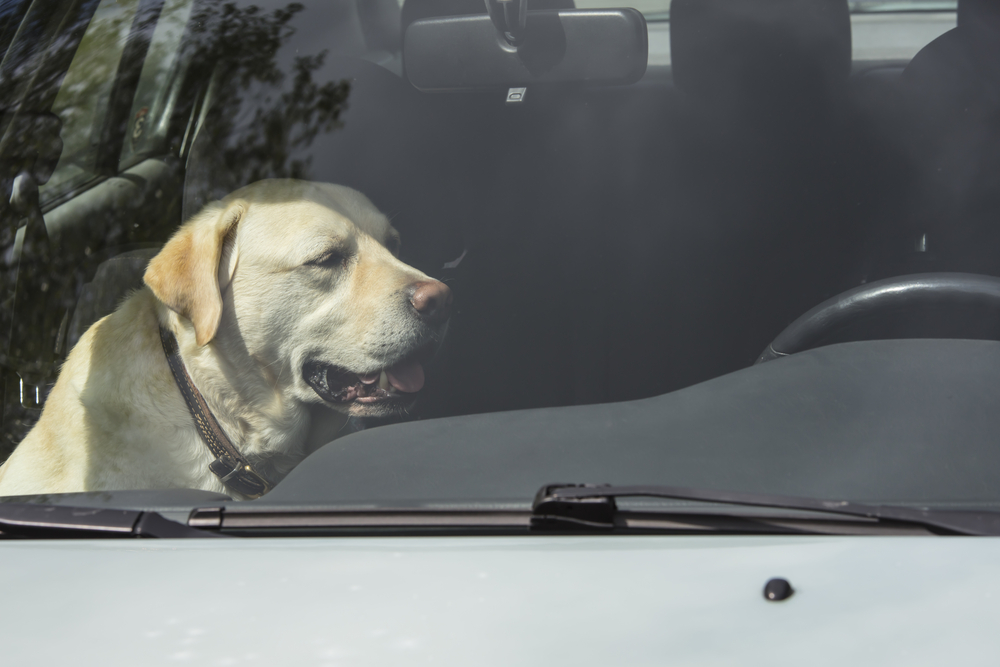It’s not officially summer, but it’s still hot outside.
The rising heat puts both small children and pets at risk if they are left in hot vehicles.
A new Kansas law, which will go into effect July 1, protects anyone from civil liability who breaks into a vehicle to rescue an animal or a vulnerable person, including a small child.
However, Hays Police Chief Don Scheibler noted people need to follow certain guidelines when trying to rescue a person or pet.
• The Good Samaritan has to determine the person or animal in the vehicle is in immediate danger.
• The person has to determine there is no other safe way of getting the person or pet out of the vehicle.
• The person also must call 911 right before or after he or she breaks into the vehicle.
• The person also must remain on the scene until law enforcement arrives.
Scheibler said he hopes this new law will serve to educate the public about the dangers of hot vehicles.
“This is a good thing. It allows people to take some sort of action in those situations in which people or animals need their assistance,” Scheibler said. “The important thing is people need to use good judgement, and they should never hesitate to call us in those situations. I think this law has good intentions to try to educate the public and prevent tragedies.”
A number of years ago a child died in a hot car in Hays. The person who was attending to the child did not usually take the child to daycare and forgot the child was in the back seat. Scheibler recommended placing something in or on your vehicle to remind you a child is on board. This could be a ribbon on the door handle or a note on the dash.
Heat stroke is the leading cause of non-crash, vehicle-related deaths in children younger than 15, according to the American Academy of Pediatrics. Heat stroke can happen when the outside temperature is as low as 57 degrees. Organ damage starts in children when their bodies reach 104 degrees. Death can occur at 107 degrees.
Learn more on children and hot vehicles at the healthychildren.org.
There is no Kansas law that prohibits a pet owner from leaving an animal in a vehicle.
However, Scheibler said, in extreme cases, a person could be investigated for animal cruelty in the case of a pet or child endangerment in the case of a child.
Animal control will respond to all reports of endangered pets, although it may take some time for the officer to arrive.
Nikki Hausler, Hays animal control officer, said it is not enough to just see a panting dog in a vehicle. The pet must show signs of heat stroke or heat exhaustion, which can be difficult to identify. Unless it is clear the animal is in immediate risk, it is best to call police to deal with the situation.
Even in cooler temperatures, the temperature inside a vehicle rises quickly and can be a danger to any living creature.
In as little as 10 minutes, the temperature in a vehicle can increase 19 degrees, according to the American Veterinary Medical Association.
Hays Vet Dr. Mark Meier said when a dog’s body temperature reaches more than 106 degrees, its organs start to shut down. Overheating can cause death or permanent organ damage.
“I think the biggest thing is that if you don’t need to have your pets with you, leave them at home,” he said. “Pets are becoming a bigger part of our families, and it is not worth the risk.”
The city is already receiving calls about pets in hot vehicles.
“I have digital thermometer that I can use to measure the inside temperature of a vehicle,” Hausler said. “Luckily, I have not found any pets in heat distress or heat stroke, but I use the app to educate owners. Even if they crack the windows on a day with high humidity and its hot like it has been — 90 degrees — a car can heat up in the matter of minutes.”
She explained people often go into a store and think they will be there for a few minutes. They get delayed in a checkout line or they find more items they initially intended or they stop to talk to a friend — and they end up spending much more time in the store than they anticipated.
“One thing that shocks me is last summer, I was called out to the hospital for pets in vehicles,” Hausler said. “When you go for a medical appointment, it can be so much longer than you anticipate. A hospital parking lot is not the place for your dog either.”
Sharon Thompson of Hays stopped at Walmart on a recent trip to Topeka and discovered bulldogs locked in a car. She call 911 and reported it. She stayed with the vehicle for 22 minutes until the police arrived, and the owner of the pets had still not emerged from the store. She said she was in anguish watching the pets suffer in the heat until someone arrived.
Hausler said her No. 1 recommendation for pets owners is to leave the pets at home, especially during these warm months. They will be much safer.
Because of Hays being located on the interstate, local police also receive calls for people who are traveling and leave their pets in vehicles.
Hausler encouraged travelers to take their pets into to consideration when they stop. Eating at a sit-down dinner may not be the best choice for your pet. Even if you leave the car running, the car could die, the vehicle could overheat or even catch on fire.
“It may be best to get something to grab and go when you are on the road and keep the dog cool in the vehicle,” she said.

